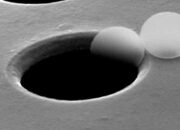Quantum chemistry represents a profound marriage of quantum mechanics and chemical phenomena, constituting a pivotal domain in the study of molecular systems. Its significance is not merely academic; it embodies a cornerstone in our understanding of matter at the most fundamental level. The intricate interplay between wave-particle duality, molecular interactions, and atomic behavior reveals a tapestry of reactions that shapes our material world. This article elucidates the critical importance of quantum chemistry, exploring its implications across various fields.
The quintessential essence of quantum chemistry lies in its ability to elucidate the behavior of electrons within atoms and molecules. Traditional chemical models frequently fail to account for the complexities introduced by quantum effects, particularly in systems exhibiting significant electron correlation. For instance, the concept of hybridization and molecular orbitals becomes a litmus test for a chemist’s understanding of bonding, showcasing that electrons do not reside in fixed orbits—as posited by classical chemistry—but rather exist in probabilities across various quantum states. This understanding is pivotal for developing accurate models in reaction dynamics and catalysis, directly influencing material synthesis and drug design.
The modern chemical landscape heavily relies on quantum chemistry for the simulation of molecular systems. With powerful computational methods such as Density Functional Theory (DFT) and Ab Initio methods, researchers are now equipped to predict reaction pathways, molecular stability, and electronic properties with unprecedented accuracy. Such predictive capabilities are vital in the realm of materials science, where the design of novel compounds—such as superconductors, semiconductors, and catalysts—hinges on quantum mechanical principles. The ramifications extend into nanotechnology, where understanding the behavior of materials at the nanoscale is imperative for innovation in electronics and energy storage.
Further, quantum chemistry serves as an essential cornerstone in the burgeoning field of drug discovery. The ability to model interactions at the molecular level facilitates the rational design of pharmaceuticals, which can lead to the successful targeting of specific biological pathways. By employing quantum chemical methods, researchers can enhance the efficacy and specificity of drug candidates, thereby paving the way for precision medicine. Understanding the quantum nature of molecular interactions permits scientists to navigate the complexities of pharmacodynamics and pharmacokinetics, creating drugs that optimize therapeutic outcomes while minimizing side effects.
The fascination with quantum chemistry is also fueled by its philosophical implications. The world of quantum mechanics challenges classical intuitions about determinism and locality. For instance, the superposition of states and the phenomenon of entanglement invite a reconsideration of how we perceive the interconnectedness of particles, as well as the nature of reality itself. Quantum chemistry not only addresses chemical behavior but also invites contemplation on deeper existential questions: What does it mean for particles to be entangled? How does the observer influence the state of a system? Such inquiries resonate profoundly with both scientists and philosophers alike, rendering quantum chemistry a subject not only of empirical inquiry but of intellectual exploration.
Moreover, the educational implications of quantum chemistry cannot be overstated. As academic institutions strive to cultivate future scientists, incorporating quantum principles into curricula fosters critical thinking and innovative problem-solving. By grappling with the abstract nature of quantum theory, students are challenged to transcend classical paradigms and engage in creative synthesis across disciplines. This foundational knowledge is essential for fostering a generation poised to tackle global challenges in health, energy, and environmental sustainability.
In considering the broader implications of quantum chemistry, one must appreciate its role in addressing contemporary global issues such as climate change. Quantum chemistry aids in the development of more efficient energy conversion methods, including solar cells and fuel cells, by elucidating the quantum mechanical processes underlying electron transfer in these systems. Additionally, developing sustainable chemical processes hinges on understanding the quantum behavior of reactants and catalysts, ultimately contributing to a more sustainable future.
The aesthetic appeal of quantum chemistry should not be overlooked. The mathematical elegance inherent in quantum models, with their intricate differential equations and wavefunctions, is often likened to art. Graphical representations of molecular geometries and energy landscapes not only convey complex information but also captivate the imagination. As scientists strive to decrypt the language of the quantum world, they engage in an artistic pursuit that transcends mere calculation, echoing the aesthetic sensibilities of the finest art forms.
In summation, quantum chemistry stands as an indispensable field within modern science, melding rigorous theoretical frameworks with practical applications. Its ability to elucidate molecular behavior, coupled with its implications across various domains, affirms its significance far beyond the abstraction of theoretical constructs. The implications for materials science, drug discovery, education, and even philosophical reflection underscore a broader narrative concerning humanity’s quest for knowledge. As we continue to delve deeper into the quantum realm, the essential importance of quantum chemistry becomes increasingly apparent, holding the key not only to future technological advances but also to a deeper understanding of the universe itself.












